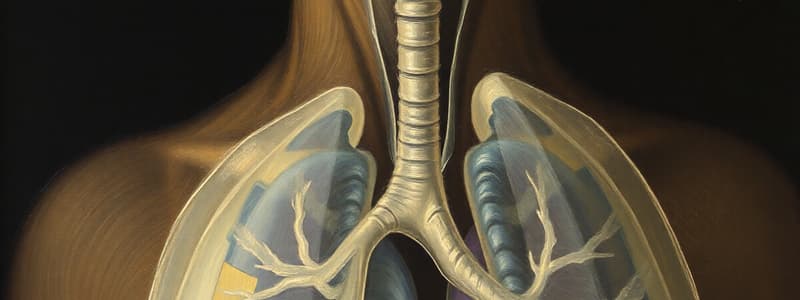Podcast
Questions and Answers
What is the definition of Residual Volume (RV)?
What is the definition of Residual Volume (RV)?
- The maximum volume air a person can breathe in after forced expiration.
- The volume of air remaining after a forcible expiration. (correct)
- The total volume air a person can expire after normal inspiration.
- The volume of air that can be forcibly inspired.
Which components are included in the Inspiratory Capacity (IC)?
Which components are included in the Inspiratory Capacity (IC)?
- Tidal Volume and Inspiratory Reserve Volume. (correct)
- Vital Capacity and Residual Volume.
- Tidal Volume and Expiratory Reserve Volume.
- Residual Volume and Expiratory Reserve Volume.
What does the Functional Residual Capacity (FRC) measure?
What does the Functional Residual Capacity (FRC) measure?
- The total volume of air a person can expire after normal inspiration.
- The maximum air volume that can be inhaled after a forced expiration.
- The total lung capacity at the end of a forced inspiration.
- The volume of air remaining after a normal expiration. (correct)
Which statement accurately describes Total Lung Capacity (TLC)?
Which statement accurately describes Total Lung Capacity (TLC)?
How does gas exchange primarily occur in the alveoli?
How does gas exchange primarily occur in the alveoli?
Flashcards
Residual Volume (RV)
Residual Volume (RV)
Volume of air remaining in the lungs after a forced exhalation.
Inspiratory Capacity (IC)
Inspiratory Capacity (IC)
The sum of Tidal Volume and Inspiratory Reserve Volume.
Functional Residual Capacity (FRC)
Functional Residual Capacity (FRC)
The volume of air remaining in the lungs after a normal exhalation.
Total Lung Capacity (TLC)
Total Lung Capacity (TLC)
Signup and view all the flashcards
Alveolar Gas Exchange
Alveolar Gas Exchange
Signup and view all the flashcards
Study Notes
Respiratory Volumes
- Residual Volume (RV): Air that remains in the lungs after maximum exhalation; averages between 1100 mL to 1200 mL.
- Inspiratory Capacity (IC): The total air volume that can be inhaled after a normal exhalation; comprises tidal volume (TV) plus inspiratory reserve volume (IRV).
- Expiratory Capacity (EC): The total air volume that can be exhaled after a normal inhalation; includes tidal volume (TV) and expiratory reserve volume (ERV).
- Functional Residual Capacity (FRC): The volume of air left in the lungs after a normal exhalation; calculated as the sum of expiratory reserve volume (ERV) and residual volume (RV).
- Vital Capacity (VC): Maximum air volume that can be inhaled following a forced exhalation, or maximum air that can be exhaled after a forced inhalation; includes expiratory reserve volume (ERV), tidal volume (TV), and inspiratory reserve volume (IRV).
- Total Lung Capacity (TLC): The maximum air volume the lungs can hold after a forced inhalation; consists of vital capacity (VC) plus residual volume (RV).
Exchange of Gases
- Gas Exchange Sites: Alveoli are the main areas for gas exchange between air and blood.
- Mechanism: Gas transfer occurs via simple diffusion, relying on differences in pressure or concentration of oxygen ($O_2$) and carbon dioxide ($CO_2$) between the alveoli and adjacent blood vessels.
- Tissue Exchange: Gas exchange also takes place between blood and body tissues, following the same diffusion principles.
Studying That Suits You
Use AI to generate personalized quizzes and flashcards to suit your learning preferences.




